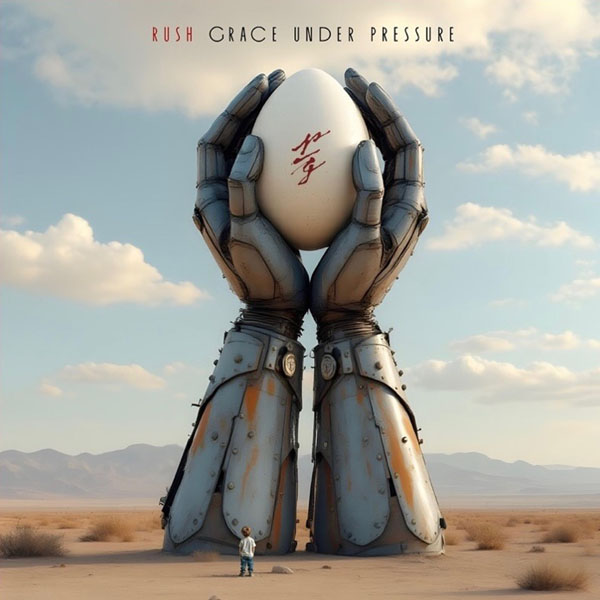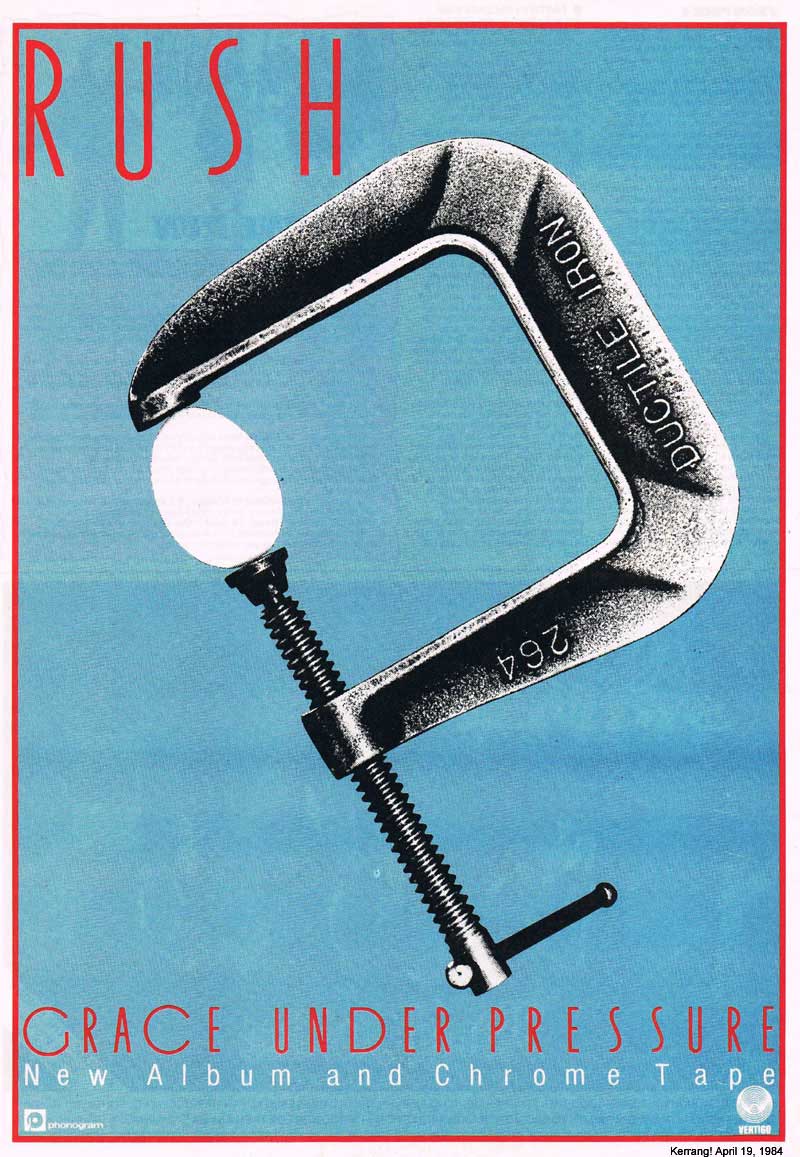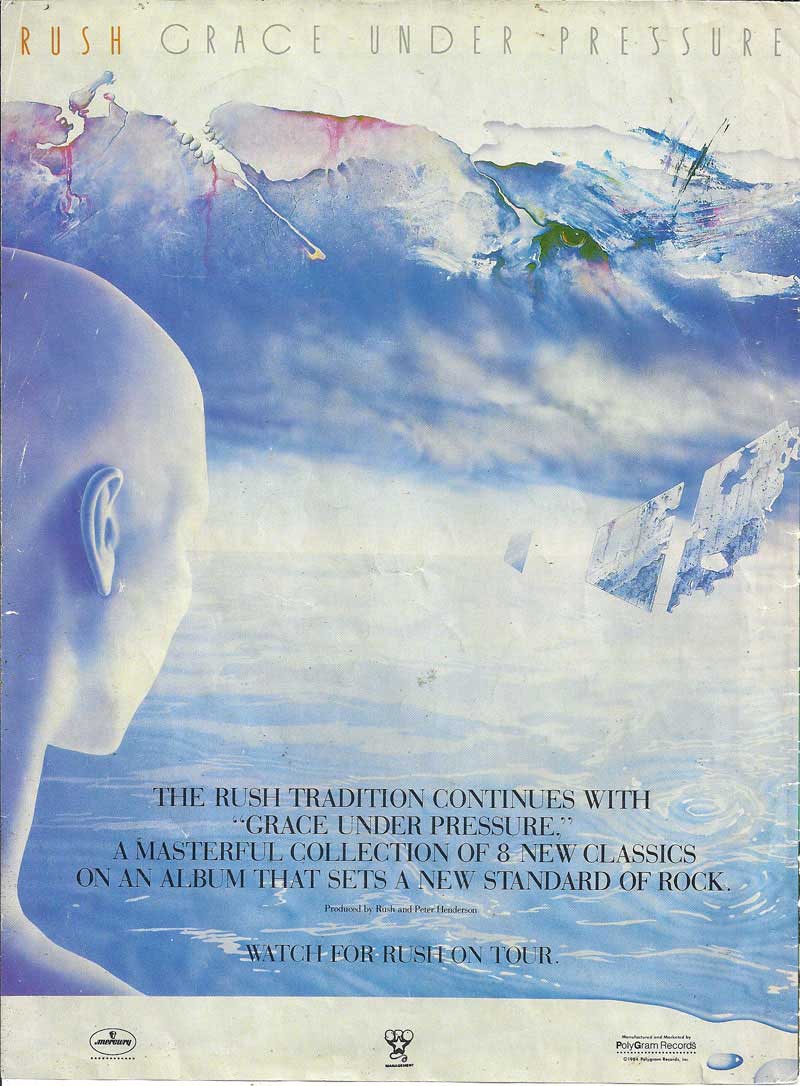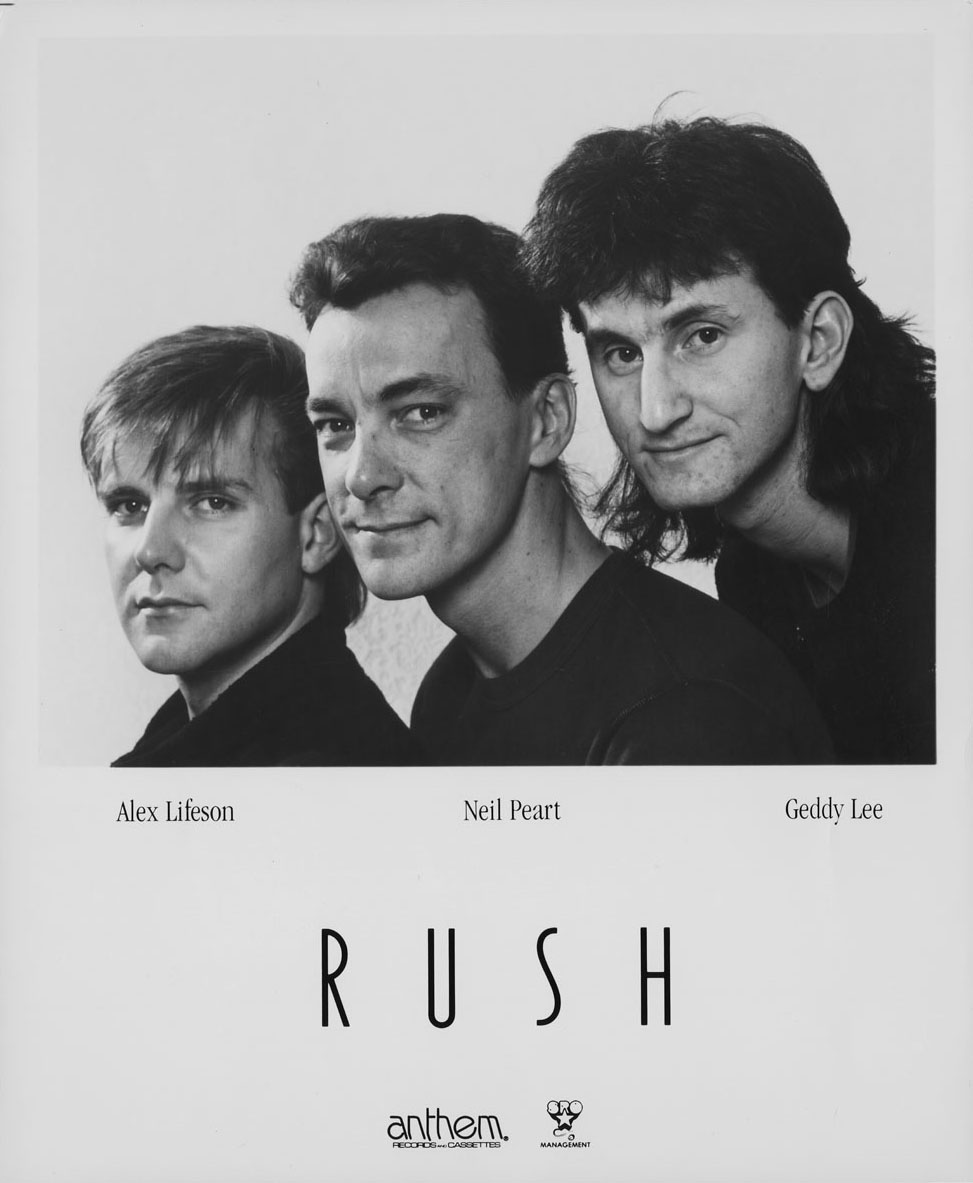
Distant Early Warning (4:59)
Afterimage (5:04)
Red Sector A (5:10)
The Enemy Within (Part I of Fear) (4:34)
The Body Electric (5:00)
Kid Gloves (4:18)
red lenses (4:42)
Between The Wheels (5:44)
Geddy Lee: Bass Guitars, Synthesizers, Vocals
Alex Lifeson: Guitars and Synthesizers
Neil Peart: Drums, Percussion, and Electronic Percussion
Music by Lee and Lifeson
Lyrics by Peart
Produced by Rush and Peter Henderson
Engineered by Peter Henderson
Assisted by Frandk Opolko and Robert Di Gioia
Recorded at Le Studio, Quebec, between
November 1983 and March 1984
In memory of Robbie Whelan
Management by Ray Danniels
SRO Productions, Inc., Toronto
Executive Production by Moon Records
Art Direction and cover painting by Hugh Syme
Portrait by Yousuf Karsh
PPG Synthesizer programming assisted by Jim Burgess and Paul Northfield
Pre-production engineering by Jon Erickson
Road Manager and Lighting Director: Howard Ungerleider
Stage Left Technician, Crew Chief, and President: Liam Birt
Stage Manager: Nick Kotos
Concert Sound Engineer: Jon Erickson
Stage Left Technican: Skip Gildersleeve
Centre Stage Technician: Larry Allen
Guitar and Synthesizer Maintenance: Tony Geranios
Monitor Engineer: Steve Byron
Concert Projectionist: Lee Tenner
Personal Assistant: Kevin Flewitt
Concert Sound by National Sound: Tom Linthicum, Fuzzy Frazer, Dave Fletcher
Concert Lighting by See Factor: The Johnson Brothers: Mike Weiss, Tom Higgins, Mark Cherry, Dave Berman, Jeffrey T. MacDonald, Frank Scilingo
Concert Rigging by Southfire Rigging: Billy Collins and Tom Wendt
Busheads and Truckfaces: Tom Whittaker, Pat Lynes, Bill Barlow, Mac and Candy MacLear, Harry Smith, Jack Stone, Red McBrine, Gordon Scott
Mille mercis à: les gens de Horseshoe Valley (Judy, Steve, Kevin, Kathy), Le Studio (André, Yaël, Paul Richard, Frank, Robert, Solange, Lina, Nancy, Yvon, Pierre, André et Michel et le Bouffe en Broche), the Mike Stone Happy Hour, the Franko Polko Singers, Trevor and the Commons, Frankie's Bar and Grill, Le Chasseur de Nuit, Bill Churchman, Barry Murphet, the International Scouting Organization of Cliff Burnstein, Peter Mensch, and Val Azzoli, the Griffin Family, NASA and the Johnson Space Centre, Roger Kneebend, Ann Uumellmahaye, Dr. Hfuhruhurr, Hentor the Barbarian, The Uglies, the Rory Gallagher Band and crew, Golden Earring and crew, Darrell and Werner en Allemagne, Yousuf and Estrellita Karsh (and Mary and Matthew), The B-Man, Tokyo Cro, Stuart Hall ("That's the weather, this is the time; now stay tuned for more news"), Jean Gallia et les autres proffesseurs de L'école Berlitz, et au bureau de SRO/Anthem: Ray, Val, Pegi, Sheila, Tom, and Marilyn, et toujours notre bon vielle ami--Broon.
We appreciate the technical assistance of: The Music Shoppe (Thornhill), Bill Ward, Marcus, the Percussion Centre (Fort Wayne), Tama Drums, Avedis Zildjian Cymbals, Direct Synthesis, Quantec, Fostex, Loft, Richard Ealey and Bruce Anthony.
© 1984 Mercury Records © 1984 Anthem Entertainment
Notes
- Mercury/Polygram, April 12, 1984
- Highest Billboard Chart Position: 10 - Certified Gold & Platinum by RIAA: June 26, 1984
- A 4:10 edit of "Red Sector A", backed by "The Enemy Within", was released on 7" and 10" red vinyl promo singles in Canada and the US.
- "The Body Electric", backed by "The Analog Kid" and "Distant Early Warning" was released as a 10" red vinyl single in the UK.
- Reissued January 8, 2016 by Universal Music Enterprises on 200-gram, heavyweight vinyl with a download code for a 320kbps MP4 vinyl ripped Digital Audio album as well as high resolution Digital Audio editions in DSD (2.8mHz), 192khz / 24-bit, 96kHz / 24-bit.
- Reissued March 13, 2026 as the Grace Under Pressure Super Deluxe Edition in various packaging options which include the original album remastered in 2025, as well as an all new Terry Brown mix plus the first-ever complete setlist of Rush at Maple Leaf Gardens in Toronto on September 21, 1984.




In Their Own Words
"They were going in a more techno direction, and it just didn't excite me. We parted on good terms though." Terry Brown on his leaving Rush after Signals, Classic Rock Presents Prog Magazine, February 2010
"I have met Geddy Lee a long time ago at Wembley Arena when Rush played there. In fact, I was a possible canditate to produce a Rush album, but when I showed up there, Trevor Horn was sitting next to me. [laughs] I said to Trevor 'What are you doing here?' and he said 'Oh, I've been asked to come and meet the band because I might be producing them', and I said 'so have I!'. That was quite a long time ago - the early 80's, I think. He cites me as a big influence? Well, that's very nice of him. They do good work, that band." - Chris Squire, YesWorld.com, July 5, 2013
"Steve Lillywhite is really not a man of his word. After agreeing to do our record, he got an offer from Simple Minds, changed his mind, blew us off and went and did the Simple Minds record. So it put us in a horrible position where we were on the verge of entering preprocduction and suddenly we had no producer. All the while we were writing and arranging material we had producers flying in, like every week, to meet with, to talk to. And it was just horrible timing, after going and trying to venture out on our own without our father figure, Terry Brown." - Geddy Lee, Contents Under Pressure
"We were supposed to do that record with Steve Lillywhite. We were in rehearsals finishing the material and we're talking about going into the studio in two weeks' time when Steve's manager called and said 'Steven is backing out of the project. Here's our lawyer's phone number. Call him if you want to sue us.' We had to scramble to find someone to work with. We had already broken away from Terry (Brown). We really wanted to work with someone else and didn't really have much of a choice. Two weeks' notice to a producer is not much time. Peter Henderson came along. He wasn't very busy and seemed like a nice guy. We said 'great, let's do it.' In four and a half months we had only one day off. It was murder. Peter was not a strong enough producer to take the reigns, to suggest a direction. He sort of turned out to be more of an engineer then a producer. So it put a lot of pressure on us. I don't dislike it. I like that record a lot. I think there's a lot of good songs on it, but I think some of those songs could've been even better." - Alex Lifeson, Industrial Music, January 1992
"With Peter [Henderson], he didn't really know our music. He had heard a few things before, and had listened to Signals so he would have some background." - Alex Lifeson, Free Music, June 1984
"There was an Alex Colville painting that we were thinking of possibly using for the album cover, but it was a little too powerful I think, and the idea for the title Grace Under Pressure, really fit that picture well. Although we decided not to use that picture we decided to stick with that title." - Alex Lifeson, Song Hits, November 1984
"...the people in 'Red Sector A', the concentration camp, are being graceful under pressure. Despite those horrific conditions, they tried to retain some semblance of normal living conditions - something they can hold on to. One idea for the album cover was someone reaching out from behind barbed wire to clutch a flower." Neil Peart, Music Express, June 1984
"The video [for "Distant Early Warning"] featured Geddy's son Julian. 'I don't remember too much, except sitting on this rocket thing as if I was riding it for a really long time,' Julian recalled. 'Neil let me play his drums, but I had to be REALLY careful!'" - Chemistry
"During our second stay at Le Studio, while recording Moving Pictures, I fell in love with the Laurentian winter. The assistant engineer, Robbie Whelan, a curly-haired, bright-eyed, enthusiastic young Englishman, introduced me to cross-country skiing, and I used to follow him through the snow-covered woodland trails... When we approached a downhill section, I would hear Robbie's whoops of excitement up ahead [webmaster note: read "The shouts of joy, skiing fast through the woods"]...On his way to work at Le Studio one morning in early 1983, Robbie was killed in a car accident. 'Afterimage,' was written for him." - Neil Peart, Roadshow
"The idea for the Fear trilogy was suggested by an older man telling that he didn't think life was ruled by love, or reason, or money, or the pursuit of happiness -- but by fear. This smart-but cynical guy's position was that most people's actions are motivated by fear of being hungry, fear of being hurt, fear of being alone, fear of being robbed, etc,. and that people don't make choices based on hope that something good will happen, but in fear that something bad will happen. I reacted to this the way all of us tend to react to generalities: 'Well, I'm not like that!' But then I started thinking about it more, watching the way people around me behaved, and I soon realised that there was something to this viewpoint, So I sketched out the three 'theaters of fear,' as I saw them: how fear works inside us ('The Enemy Within'), how fear is used against us ('The Weapon'), and how fear feeds the mob mentality ('Witch Hunt'). As it happened, the last theme was easiest to deal with, so it was written first, and consequently appeared first on record, and the other two followed in reverse order for the same reason." - Neil Peart, Rush Backstage Club Newsletter, January 1994
"Lee's parents, Mary Rubenstein and Morris Weinrib, met in a Polish labour camp in 1941, were shipped to Auschwitz and later transported to separate camps in Germany before reuniting after the war and immigrating to Canada. The horrors of the Holocaust led Lee to doubt the existence of God, but he remains deeply spiritual and his parents' ordeal directly influenced his music. 'I remember the story my mother told me of my grandfather being taken away from their home in Poland. Adult males who caused trouble were taken away and shot. My mother snuck out of the house after her father's arrest and tracked him down where he along with others was lined up. She tripped and fell and got poked with a gun by a German soldier. Her father turned around and was pleading with her to go back. She did and that was the last time she saw him.'" - "Auschwitz Remembered", Toronto Star, pg. A13, January 23, 2005
"Perhaps the most well-known of Holocaust-influenced rock songs as it first appeared on the band's hit 1984 album Grace Under Pressure, and has been a staple of the band's live shows ever since. The seeds for this harrowing rocker were planted 60 years ago in April of 1945 when British soldiers liberated the Nazi concentration camp Bergen-Belsen. Rush lead singer Geddy Lee's mother, Mary Rubenstein, was among the survivors. 'I once asked my mother her first thoughts upon being liberated,' Lee said. 'She didn't believe (liberation) was possible. She didn't believe that if there was a society outside the camp how they could allow this to exist... ' Lee related the story to band drummer and lyricist Neil Peart and also wrote the music. Peart came up with lines such as: 'Are we the last ones left alive?/ Are we the only human beings to survive?' 'The whole album,' Lee said, 'is about being on the brink and having the courage and strength to survive.'" - Rock 'N' Roll Never Forgets Holocaust's Horror, Palm Beach Post, May 6, 2005
"That song goes back to a story my mother told me about being liberated [from Bergen-Belsen] and how she wasn't quite sure what was going on. She was in a section of the camp, working and looked out the window to see all these soldiers with their arms up. She thought this was some sort of new salute to Hitler. She hadn't realized that they were being liberated. But when she finally realized, her first reaction was, 'What took you so long?' All the while, she had assumed the rest of the world was suffering as well and going through similar conditions...When I told this story to Neil [Peart] (drummer and lyricist), parts of the story had some impact on him, and he came up with 'Red Sector A.'" - Geddy Lee, Heeb Magazine, Spring 2009
"When the Nazis came into the Polish town where my mother lived, they kept the Jews in a ghetto and then marched them to a labor camp. My father was from a different village, but was at the same work camp. They were 12 or 13, and then they were both sent to Auschwitz. My father would bribe the guards to give her shoes or food, little signs of affection. They fell in love in that horrible environment. Then she was transferred to Bergen-Belsen, and after the war she assumed he hadn't survived. My dad made a point of finding her. We grew up very aware of the Holocaust. My mother's 83, and she freaks out if I leave a door unlocked. Holocaust survivors don't ever really feel secure. They're always waiting for those soldiers to come back. I was lucky that I had my dad for 12 years, and my mom's still going strong at 83." - Geddy Lee, Blender, April 2009
"Geddy's parents met as youngsters at Auschwitz, and he told me once how his mother recalled that when they were finally freed-after ninety per cent of Poland's Jews had been exterminated-they were certain they must be the last people alive on Earth. Because if they had endured so much horror, and the world had allowed that to happen, how could anyone else have survived? That notion inspired our song 'Red Sector A,' with the lines, 'Are we the last ones left alive?/ Are we the only human beings to survive?' The title gives the song a whiff of science fiction, which perhaps makes it seem less grim than the true history it relates, and that is fine with me. (In a now delicious irony, 'Red Sector A' was the name of our viewing area as guests at the launch of the first Space Shuttle, Columbia, in 1981.) A memoir by another female survivor of Auschwitz filled in more details, like how if anyone appeared too ill or feeble to work, they would be sent straight to the gas chambers. So even in that dehumanized nightmare, people showed 'grace under pressure,' and tried to help each other appear 'healthy.' ('For my father and my brother, it's too late/But I must help my mother stand up straight.')" - Neil Peart, NeilPeart.net, June 2013
Promos
Smartphone Wallpaper
Our RUSH smartphone wallpapers have been modified for a 9:19.5 aspect ratio to fit "most" Smartphones.
This is a collection of transcripts of magazine and newspaper articles and other media related to this release or coinciding with the time frame surrounding it. This is an ongoing work in progress; feel free to email any suggested additions.










